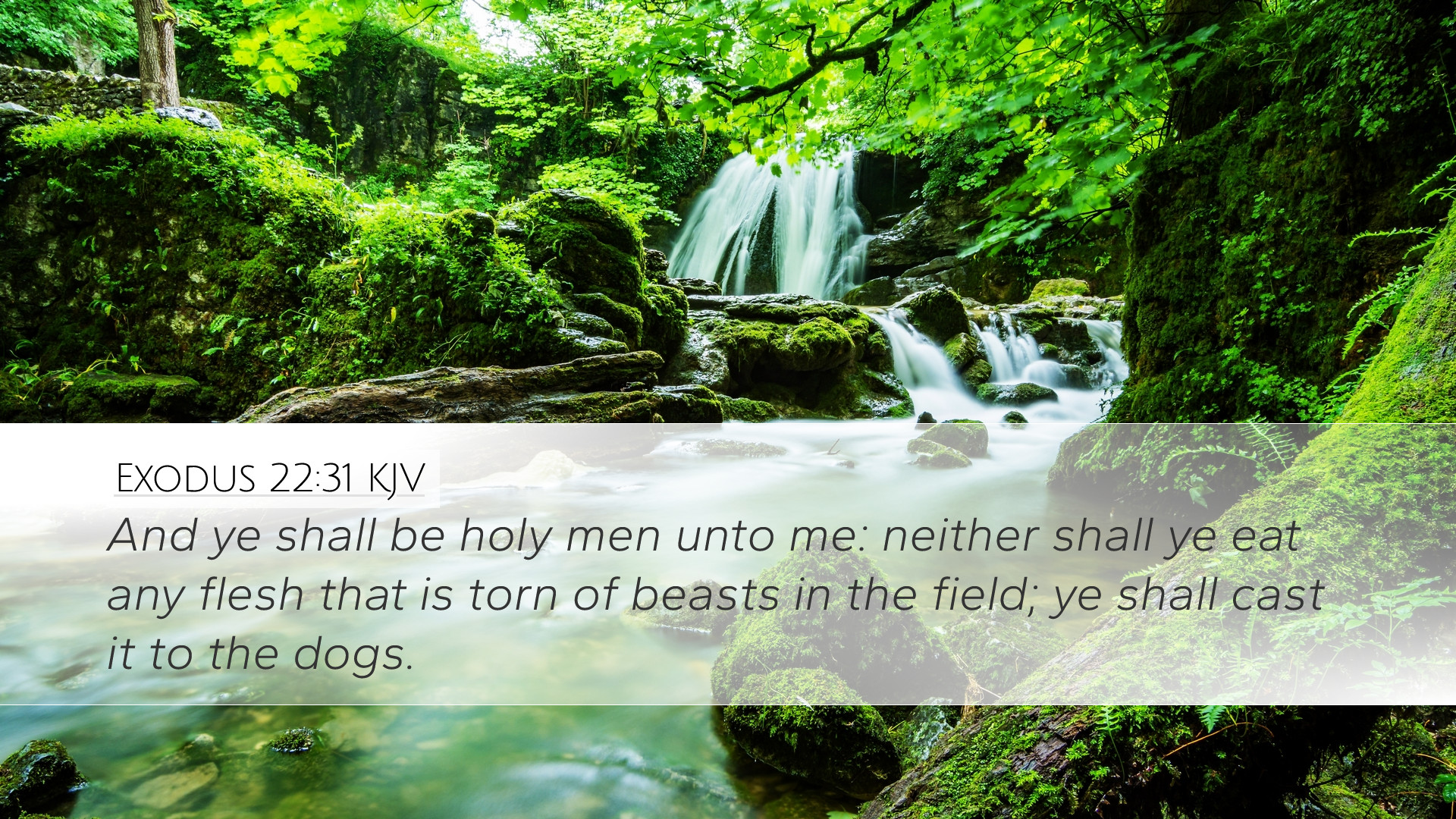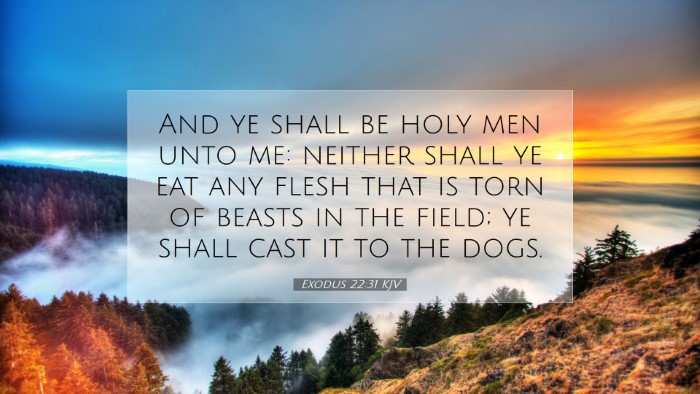Commentary on Exodus 22:31
Verse: "And ye shall be holy men unto me: neither shall ye eat any flesh that is torn of beasts in the field; ye shall cast it to the dogs." (Exodus 22:31, KJV)
Introduction
The verse Exodus 22:31 serves as a crucial part of God's covenant with Israel, emphasizing the requirements for holiness among His people. The directives provided in this verse are multifaceted, encompassing spiritual, ethical, and communal dimensions. This commentary seeks to explore the theological implications and practical applications of this passage by synthesizing insights from notable public domain commentaries.
The Call to Holiness
Matthew Henry emphasizes that the call to holiness is foundational for God's people. He interprets "holy men" as those who are distinct and set apart for divine purposes. This call is not merely about ritual purity but involves a transformational lifestyle that reflects God’s character. In this regard, the notion of holiness extends into everyday living.
Albert Barnes supports this idea by explaining that holiness involves maintaining a moral standard that differs from worldly practices. He remarks that being “holy” includes conduct consistent with God's laws and an attitude of reverence toward Him. Barnes sees the call to holiness as an imperative for communal identity, as it reflects the relationship Israel has with God.
Prohibition of Eating Torn Flesh
The second half of the verse addresses a specific command regarding dietary restrictions: “neither shall ye eat any flesh that is torn of beasts in the field.” This command carries symbolic weight concerning what is considered clean and unclean.
Adam Clarke provides insight into the significance of this prohibition. He mentions that animals torn by beasts are typically associated with disease and decay, and consuming such flesh could lead to physical and spiritual contamination. Clarke points out that this prohibition serves as a metaphor for the kind of influences to which believers must not expose themselves.
Symbolism and Spiritual Meanings
Matthew Henry further interprets the torn flesh as indicative of the corrupting influences of sin and the dangers of associating with unclean practices. He draws an analogy to the New Testament concept of spiritual nourishment, suggesting that just as physical health requires a proper diet, spiritual vitality requires the consumption of untainted truths and practices.
Albert Barnes notes that the instruction against eating torn flesh is meant to instill a sense of purity and caution regarding food, which was deeply tied to the Israelites' covenant relationship with God. He argues that the act of eating is deeply communal, and thus the food shared among the people should reflect their holy standing before God.
Application for Modern Believers
This command, while rooted in ancient Israelite culture, offers valuable lessons for modern believers:
- Commitment to Holiness: Today’s believers are called to exhibit holiness through their choices, reflecting God's character in all areas of life, including dietary practices as a metaphor for broader ethical decisions.
- Discernment in Influences: The torn flesh can be seen as a caution to avoid corrupt influences in society that may lead to spiritual decay. Believers must discern what they partake in, whether it be media, relationships, or ideologies.
- Community and Identity: Just as the Israelites were reminded of their identity as God’s people, Christians today must cultivate a sense of community that reflects their collective purpose as bearers of God's image.
Theological Implications
This passage invites deeper reflection on God’s expectation for His people. The commands issued not only regulate behavior but also invite believers into a deeper relationship with the Lord, urging them to live as sanctified individuals within a community that honors God.
Matthew Henry concludes that the laws given in Exodus, including this directive, reveal the nature of God’s holiness and His desire for His people to emulate it. This call to holiness serves both as a privilege and a responsibility for believers to pursue a lifestyle that honors God.
Albert Barnes underscores that this passage ultimately points to the purifying effect of obedience to God's commands, which leads to a deeper communion with Him. The ethical lifestyle prescribed to Israel becomes a template for Christians who aim to align their lives with divine standards.
Conclusion
Exodus 22:31 provides a profound reminder of the nature of holiness and what it means to be God's people. As we integrate these insights from Matthew Henry, Albert Barnes, and Adam Clarke, modern believers can glean both personal and communal applications that resonate with their faith journeys. Ultimately, this passage calls for a deepened commitment to live holy lives that reflect the character of God in a world that desperately needs His light.


